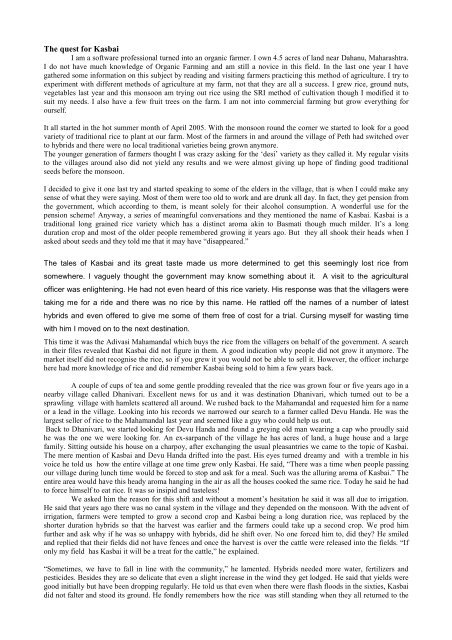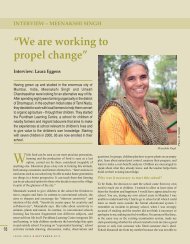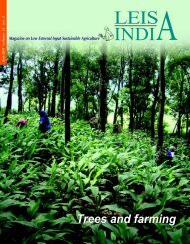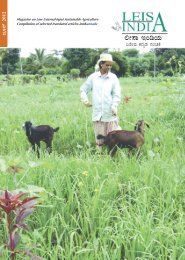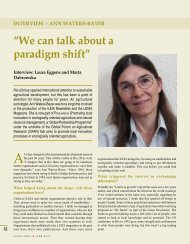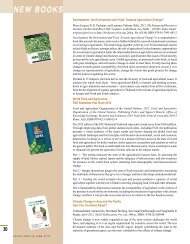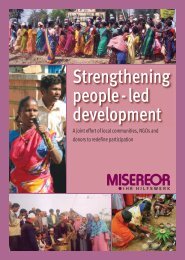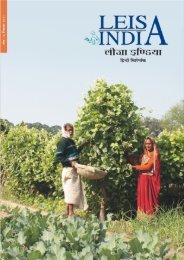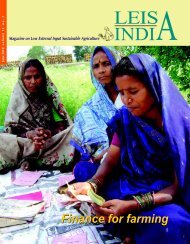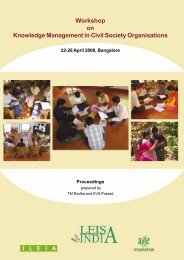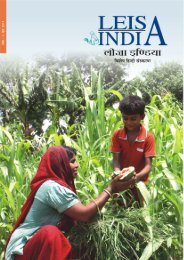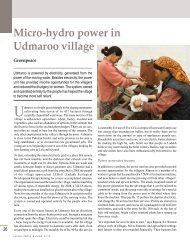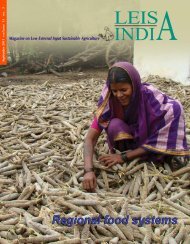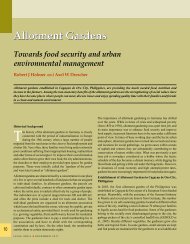The quest for Kasbai - Leisa India
The quest for Kasbai - Leisa India
The quest for Kasbai - Leisa India
- No tags were found...
Create successful ePaper yourself
Turn your PDF publications into a flip-book with our unique Google optimized e-Paper software.
<strong>The</strong> <strong>quest</strong> <strong>for</strong> <strong>Kasbai</strong>I am a software professional turned into an organic farmer. I own 4.5 acres of land near Dahanu, Maharashtra.I do not have much knowledge of Organic Farming and am still a novice in this field. In the last one year I havegathered some in<strong>for</strong>mation on this subject by reading and visiting farmers practicing this method of agriculture. I try toexperiment with different methods of agriculture at my farm, not that they are all a success. I grew rice, ground nuts,vegetables last year and this monsoon am trying out rice using the SRI method of cultivation though I modified it tosuit my needs. I also have a few fruit trees on the farm. I am not into commercial farming but grow everything <strong>for</strong>ourself.It all started in the hot summer month of April 2005. With the monsoon round the corner we started to look <strong>for</strong> a goodvariety of traditional rice to plant at our farm. Most of the farmers in and around the village of Peth had switched overto hybrids and there were no local traditional varieties being grown anymore.<strong>The</strong> younger generation of farmers thought I was crazy asking <strong>for</strong> the ‘desi’ variety as they called it. My regular visitsto the villages around also did not yield any results and we were almost giving up hope of finding good traditionalseeds be<strong>for</strong>e the monsoon.I decided to give it one last try and started speaking to some of the elders in the village, that is when I could make anysense of what they were saying. Most of them were too old to work and are drunk all day. In fact, they get pension fromthe government, which according to them, is meant solely <strong>for</strong> their alcohol consumption. A wonderful use <strong>for</strong> thepension scheme! Anyway, a series of meaningful conversations and they mentioned the name of <strong>Kasbai</strong>. <strong>Kasbai</strong> is atraditional long grained rice variety which has a distinct aroma akin to Basmati though much milder. It’s a longduration crop and most of the older people remembered growing it years ago. But they all shook their heads when Iasked about seeds and they told me that it may have “disappeared.”<strong>The</strong> tales of <strong>Kasbai</strong> and its great taste made us more determined to get this seemingly lost rice fromsomewhere. I vaguely thought the government may know something about it. A visit to the agriculturalofficer was enlightening. He had not even heard of this rice variety. His response was that the villagers weretaking me <strong>for</strong> a ride and there was no rice by this name. He rattled off the names of a number of latesthybrids and even offered to give me some of them free of cost <strong>for</strong> a trial. Cursing myself <strong>for</strong> wasting timewith him I moved on to the next destination.This time it was the Adivasi Mahamandal which buys the rice from the villagers on behalf of the government. A searchin their files revealed that <strong>Kasbai</strong> did not figure in them. A good indication why people did not grow it anymore. <strong>The</strong>market itself did not recognise the rice, so if you grew it you would not be able to sell it. However, the officer inchargehere had more knowledge of rice and did remember <strong>Kasbai</strong> being sold to him a few years back.A couple of cups of tea and some gentle prodding revealed that the rice was grown four or five years ago in anearby village called Dhanivari. Excellent news <strong>for</strong> us and it was destination Dhanivari, which turned out to be asprawling village with hamlets scattered all around. We rushed back to the Mahamandal and re<strong>quest</strong>ed him <strong>for</strong> a nameor a lead in the village. Looking into his records we narrowed our search to a farmer called Devu Handa. He was thelargest seller of rice to the Mahamandal last year and seemed like a guy who could help us out.Back to Dhanivari, we started looking <strong>for</strong> Devu Handa and found a greying old man wearing a cap who proudly saidhe was the one we were looking <strong>for</strong>. An ex-sarpanch of the village he has acres of land, a huge house and a largefamily. Sitting outside his house on a charpoy, after exchanging the usual pleasantries we came to the topic of <strong>Kasbai</strong>.<strong>The</strong> mere mention of <strong>Kasbai</strong> and Devu Handa drifted into the past. His eyes turned dreamy and with a tremble in hisvoice he told us how the entire village at one time grew only <strong>Kasbai</strong>. He said, “<strong>The</strong>re was a time when people passingour village during lunch time would be <strong>for</strong>ced to stop and ask <strong>for</strong> a meal. Such was the alluring aroma of <strong>Kasbai</strong>.” <strong>The</strong>entire area would have this heady aroma hanging in the air as all the houses cooked the same rice. Today he said he hadto <strong>for</strong>ce himself to eat rice. It was so insipid and tasteless!We asked him the reason <strong>for</strong> this shift and without a moment’s hesitation he said it was all due to irrigation.He said that years ago there was no canal system in the village and they depended on the monsoon. With the advent ofirrigation, farmers were tempted to grow a second crop and <strong>Kasbai</strong> being a long duration rice, was replaced by theshorter duration hybrids so that the harvest was earlier and the farmers could take up a second crop. We prod himfurther and ask why if he was so unhappy with hybrids, did he shift over. No one <strong>for</strong>ced him to, did they? He smiledand replied that their fields did not have fences and once the harvest is over the cattle were released into the fields. “Ifonly my field has <strong>Kasbai</strong> it will be a treat <strong>for</strong> the cattle,” he explained.“Sometimes, we have to fall in line with the community,” he lamented. Hybrids needed more water, fertilizers andpesticides. Besides they are so delicate that even a slight increase in the wind they get lodged. He said that yields weregood initially but have been dropping regularly. He told us that even when there were flash floods in the sixties, <strong>Kasbai</strong>did not falter and stood its ground. He fondly remembers how the rice was still standing when they all returned to the
village after the floods had receded. “Such was the strength of the rice. But look what we have done,” he saidexpressively. As he goes on reminiscing about the rice, we gently guide him back to the reason of our visit, the <strong>Kasbai</strong>seeds… He says the only people who still grow it would be the Adivasis in a hamlet at the foothills in the next village.We bid farewell to Devu Handa as he lovingly blesses us and tells us that Mahalaxmi, the local goddess will give us theseeds of <strong>Kasbai</strong>.Armed with his blessings we reach Asarvari and start our search <strong>for</strong> the adivasi hamlets. We are not very fluent withthe local dialect of Marathi and re<strong>quest</strong> the sarpanch of the village to help us out. He dispatches Jeevan, his trusted aidewith us into the hills. A half hour walk through thick vegetation, crossing numerous streams and ditches and scramblingover rocks and gravel we reach the sleepy hamlet of Boripada. <strong>The</strong>re are just two houses in front of us and we wonderif this is the right place. A wrinkled old woman sitting in the porch of one of the houses looks at us with curiosity.Approaching her we signal to Jeevan to ask the crucial <strong>quest</strong>ion. She mutters in reply and we look at Jeevan <strong>for</strong> a quickinterpretation. He breaks into a smile and in<strong>for</strong>ms us that she does have the rice and wants to know who we are andwhy we want it. It was a difficult task to keep a straight face and control our strong desire to rush and hug her . Forhere after searching <strong>for</strong> months, we had found the elusive <strong>Kasbai</strong>. We explained to her that we are from Peth nearbyand we needed the seeds to grow it. We ask <strong>for</strong> 10 kilos of rice. She mutters and she scowls. We wonder what couldhave triggered this. Jeevan interprets that she has never heard of Peth village and also does not have a weighing scaleand can give the rice only in baskets. We ask <strong>for</strong> a basket of rice. As she barks at someone in the house to get the rice,we wonder what size the basket would be. We collect the rice she gets us in a sack and ask about the payment. Jeevansays she does not know- just pay her something. We hand over a 100 rupee note and <strong>for</strong> the first time in the last tenminutes, her face breaks into a smile. She nods her head in approval. As we walk into the fading sunset, leaving behinda smiling old lady we can’t help wondering that here, nestling in the foothills of a unknown mountain away from thehustle bustle of the road or the city, were the real people of <strong>India</strong>. <strong>The</strong>se are the people who still hold the richbiodiversity of our land and no one even cares about them. <strong>The</strong>y have never heard of hybrids, fertilizers or pesticides.<strong>The</strong>y just grow their rice and eat what they get. <strong>The</strong> old lady we met has probably never left Boripada. Her world isunspoilt by “progress.” And <strong>for</strong> once I was grateful <strong>for</strong> that.My name is Iyer Venkateshwaran. I am 39 years old and was working <strong>for</strong> IBM as a software professionaltill December 2003. I quit my IT job and am now into Organic Farming. I have taken up 4.5 acres of landnear Dahanu, Maharashtra about 100 kms from Bombay and <strong>for</strong> the last 1 year have been practicingOrganic Agriculture.I am a science graduate (Physics) and have done a course in computers. I was working in the IT field <strong>for</strong>the last 15 years and am a Certified Project Manager. I wanted to do something meaningful in life thanpunch at the keyboard and was amply supported by my wife in this line of thought. She is a journalistworking <strong>for</strong> the <strong>The</strong> Hindu in Bombay. She has authored a book on Organic Cotton and its history in <strong>India</strong>.Both of us are very keen on the organic method of cultivation and intend to live off the land. It will not belong be<strong>for</strong>e she will quit her job and move in with me at the farm. Presently, I am usually there during theweek and come to Bombay <strong>for</strong> the weekends.I do not have much knowledge of Organic Farming and am still a novice in this field. In the last one year Ihave gathered some in<strong>for</strong>mation on this subject by reading and visiting farmers practicing this method ofagriculture. I try to experiment with different methods of agriculture at my farm, not that they are all asuccess. I grew rice, ground nuts, vegetables last year and this monsoon am trying out rice using the SRImethod of cultivation though I modified it to suit my needs. I also have a few fruit trees on the farm. I amnot into commercial farming but grow everything <strong>for</strong> our self. We are only two of us and have no children.It does not need much to feed us so we are trying to do just that. Whatever extra remains we try and sell itoff to our friends who are keen on organicstuff.I usually work on my farm and take in nearby villagers on a need basis. I do not use any external inputslike fertilizers or pesticides nor do I trust any of the new fangled bio dynamic products. I have two compostpits and use the plants around the farm to make my own medicines <strong>for</strong> the crops. Am still far away fromsharing this knowledge but am trying my best to use the knowledge of plant life around to help myself.So thats about us and our little farm.Venkat Iyer


